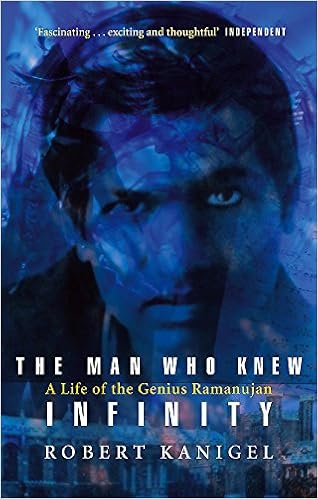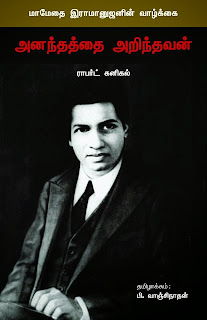 In a very interesting coincidence I got both the English and Tamil versions of this book as gift from two different friends last December just days apart! The English version came in first from a friend that gives me books each time we meet. As you may know, this book has been made into a movie couple of years back. Since I had seen the movie (and so knew the main plot points), I had kept it in the "toRead" list a little further down the line. Few days later I met another friend who is the actual translator of the book into Tamil. Apparently it has been translated into multiple Indian languages as a "National Book Trust" project in India to commemorate Ramanujan's 130th year anniversary. The crispness of the Tamil translation's title (Ananthathai Arinthavan that precisely translates to The Man Who Knew Infinity in an elegant way) bowled me over. It’s been a while since I had read a serious book in Tamil. So, took it up immediately. Since I had both English and Tamil versions with me, went back and forth between the two versions almost chapter by chapter. It was a very interesting experience since I had never read a full book in two languages simultaneously ever before. :-)
In a very interesting coincidence I got both the English and Tamil versions of this book as gift from two different friends last December just days apart! The English version came in first from a friend that gives me books each time we meet. As you may know, this book has been made into a movie couple of years back. Since I had seen the movie (and so knew the main plot points), I had kept it in the "toRead" list a little further down the line. Few days later I met another friend who is the actual translator of the book into Tamil. Apparently it has been translated into multiple Indian languages as a "National Book Trust" project in India to commemorate Ramanujan's 130th year anniversary. The crispness of the Tamil translation's title (Ananthathai Arinthavan that precisely translates to The Man Who Knew Infinity in an elegant way) bowled me over. It’s been a while since I had read a serious book in Tamil. So, took it up immediately. Since I had both English and Tamil versions with me, went back and forth between the two versions almost chapter by chapter. It was a very interesting experience since I had never read a full book in two languages simultaneously ever before. :-)  While Ramanujan's story is a really sad one, reading the book was a delight in several ways. I don't read a lot of biographies. But whenever I had read them in the past, they tended to be about Physicists/Mathematicians from Europe in the mid 20th century or books like Agony and the Ecstasy describing the life of Michelangelo and so on. At the time I read those books, I had not seen much of Europe and so had to imagine most of what was being described. But in this case, the small Tamilnadu towns where Ramanujan grew up, the kind of houses he lived in, names of the people who were part of his life, the schools and temples he frequented were all extremely familiar to me as I grew up in the same parts of India with similarly named relatives/friends in my childhood speaking the same language and eating the same food. This sense of familiarity added to the fun. If I had read the book only in English or only in Tamil, I wouldn't have had a chance to learn a slew of Tamil words for complex Math and Science terms (for example, Tamil term for String Theory is "Izhaiyooga Iyarppiyal”). Google translation is not showing the same term in Tamil. The rhyming poetic nature of such terms indicate that they were probably coined by the Tamil translator Prof. P. Vanchinathan, as he has a long track record of such cleverness. (He has developed a Python script that can verify whether a Tamil poem written to be of certain clause (called Venba) passes all the requirements!). He has nicely translated even the occasional English poems embedded in the English version of the book.
While Ramanujan's story is a really sad one, reading the book was a delight in several ways. I don't read a lot of biographies. But whenever I had read them in the past, they tended to be about Physicists/Mathematicians from Europe in the mid 20th century or books like Agony and the Ecstasy describing the life of Michelangelo and so on. At the time I read those books, I had not seen much of Europe and so had to imagine most of what was being described. But in this case, the small Tamilnadu towns where Ramanujan grew up, the kind of houses he lived in, names of the people who were part of his life, the schools and temples he frequented were all extremely familiar to me as I grew up in the same parts of India with similarly named relatives/friends in my childhood speaking the same language and eating the same food. This sense of familiarity added to the fun. If I had read the book only in English or only in Tamil, I wouldn't have had a chance to learn a slew of Tamil words for complex Math and Science terms (for example, Tamil term for String Theory is "Izhaiyooga Iyarppiyal”). Google translation is not showing the same term in Tamil. The rhyming poetic nature of such terms indicate that they were probably coined by the Tamil translator Prof. P. Vanchinathan, as he has a long track record of such cleverness. (He has developed a Python script that can verify whether a Tamil poem written to be of certain clause (called Venba) passes all the requirements!). He has nicely translated even the occasional English poems embedded in the English version of the book.One disappointment I had with the book is that after reading it, I am not left with a lot more new information that I will carry forward. I did learn about the Wrangler, Senior Wrangler ranking in Cambridge, will remember the timeline of Ramanujan's story better, etc. But in the end I am left with the same details of what I had known before, Ramanujan's difficult days in India, his contact with G.H.Hardy, his miserable time in England while he published a lot with Hardy and his subsequent return to India followed by his demise. These broad strokes are what you are left with in the end. Compared to the movie, the book does get into lot more mathematical details to which I am grateful. Just to make sure I remember at least something brand new that I didn't know before, I went and read about Ramanujan’s Tau Function on the web.
Book talks a lot about how India hasn't changed much to be able to recognize such hidden gems that may be lurking around. While I do sympathize with this view, I am not very clear on what is a good solution that will prevent future Ramanujans being left undiscovered. He wasn't good at taking tests and acing them. So, he didn't finish college in India and as a result couldn't proceed through normal channels to get the recognition he deserved. While he had knocked the doors of dozens of potentials patrons to get support to continue his research, he eventually succeeded when Hardy read his letter and came forward to help him. It would have been very nice if the first person he contacted quickly recognized the immensity of his talent and work and gave him all the support he needed. But hind sight is 20/20. Today how can we separate real talent coming in through unorthodox means from fakes that claim superiority? Naturally we don't want to be fooled by charlatans or waste resources on those who may truly believe they are talented but in reality are not. Do you live in a country/society that has a means to recognize future Ramanujans who don't want to go through the regular academic channels? If so, let me know how the process works.
Book's author Robert Kanigel deserves a lot of credit/respect for the amount of research he has done, traveling through every part of rural/urban South India pertinent to Ramanujan's story (his description of the houses in small town India that I am familiar with stands out so vividly compared to Western homes that are architecturally/philosophically/functionally very different) as well as parts of England that Ramanujan spent time on, gathering a lot of details from first world war time archives and so on. Details in the book reflects his sincerity in trying to bring out a book that gives the readers a very close personal vivid record of Ramanujan's life, which was so very different from Hardy's. There are a lot of discussions about how scholars of Oxbridge lived in the early parts of 20th century. They were highly respected, well connected, all men, many of whom remained bachelors, wrote papers, attended conferences across Europe, had servant maids to cook & clean and so wouldn't have known how to make a simple meal. Contrast that life style with Ramanujan's who was displaced from his familiar surroundings, being a strict Tamil Brahmin couldn't eat non-vegetarian food and so had to cook for himself, was often depressed, wasn't comfortable with his fellow colleagues/neighbors but had an amazing ability to churn out paper after paper on higher order mathematics that stunned his English colleagues!
Even though I wish I could retain a lot more of Ramanujan's math, the book has lot more details compared to the movie. So, worth a read. BTW, while the movie was decent, I was puzzled by the way the actor portraying Ramanujan (actor Dev Patel) pronounced the name like an American rather than like a South Indian (who’d pronounce it as Raa-maa-nu-jan). Since the whole plot of the movie is describing how uncomfortable Ramanujan was in England not being able to give up his TamBram habits, the actor mispronouncing the protagonist’s name was awkward!
If you can read Tamil, please order the book from this National Book Trust link:
http://www.nbtindia.gov.in/books_detail__9__national-biography__2733__a-man-who-knew-infinity.nbt
Books of this kind are hard to come by particularly in languages like Tamil. So, we owe the team that brought it out our support via ordering a copy.